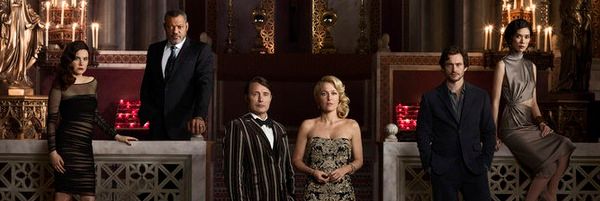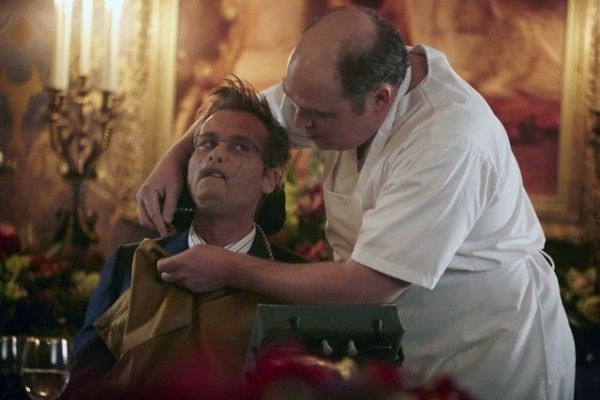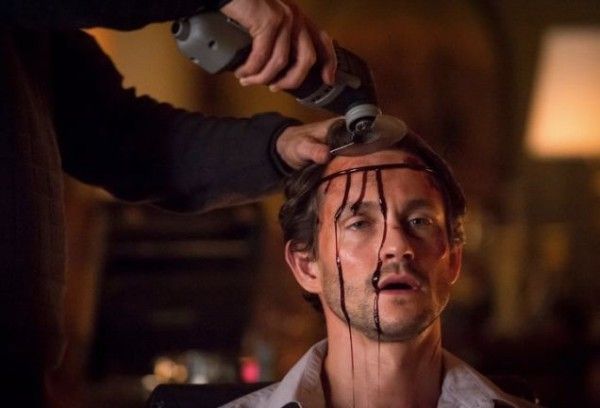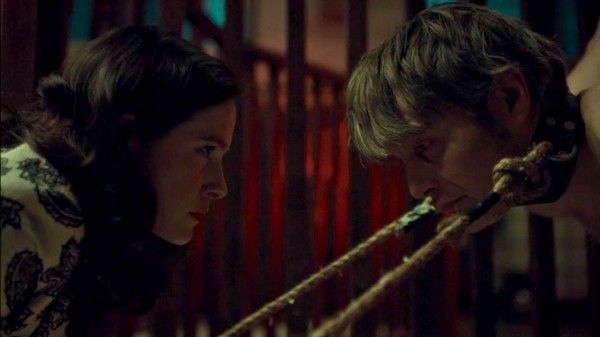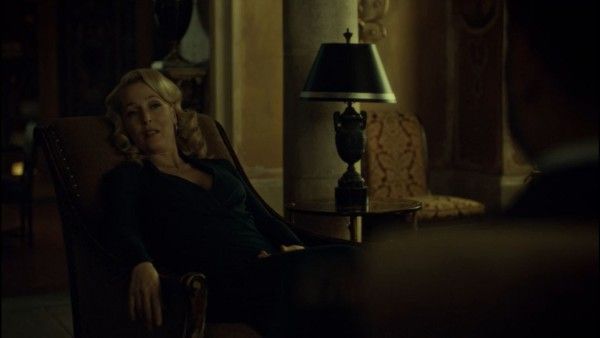You must excuse my absence, as another ghastly affair - namely, Comic-Con - kept me away from the grisly doings and flamboyant excursions of Hannibal, now moved to Saturday nights for the remainder of its run on NBC. It's even more apropos, following NBC's dunderheaded decision to axe its best show, that "Dolce" feels like a grand gesture of freedom, one last, marvelous indulgence before Hannibal's capture, much like "Antipasto" both visually and narratively reverberated the feeling of liberation our anti-hero felt by leaving behind his feigned persona in Baltimore. The acid-trip imagery of Bedelia's drug-induced attempt at covering her tracks with her favorite patient alone would register as one of the series' most electrically strange stylistic choices to date, and that was just a piece of what made "Dolce" such a simultaneously beguiling and enthralling watch.
Jack and Will's questioning of Bedelia would also qualify as one of the most darkly funny moments in the show's history, and the humor hinged almost entirely on Gillian Anderson's refined, exuberant delivery and physical reactions, from a quick twitch of the hand to the cocking of an eyebrow. This itself would count as a reflection of the show's wildly expressive editing and exquisite sense of symbolism, which proved just as intoxicating and potent here as it has this entire season, taking time to savor a blood drop infiltrating a clear pool of water or, conversely, water washing away the damage done by Jack's beating of Hannibal at the end of "Contorno." And, appropriately, there is a more straightforward visual tempo achieved when the episode focused on Mason Verger (Joe Anderson), alongside Cordell (Glenn Fleshler), his chef, and his plans to "peking-duck" his former psychiatrist, while also teasing plans to father a child with his sister, Margot (Katharine Isabelle). Though still gorgeous, to the point of decadency at times, these images didn't seem to flow from a dreamscape the way Will and Hannibal's scenes tend to.
In terms of story, however, "Dolce" served largely as set-up for the conclusive "Digestivo," though Bryan Fuller and his writers room are smart enough not to make the episode feel like a brooding run-up. From Bedelia's washing of Hannibal's wounds to the good doctor's attempt to crack open Will's skull and feast on his frontal lobe, "Dolce" felt fanatically in-the-moment at every turn, as did "Digestivo," which takes place almost entirely at Muskrat Farms, the Verger estate where they raise and slaughter their pigs. Anyone familiar with Thomas Harris' source material knew that this had to end badly for Mason, at the very least, but the episode didn't feel inevitable or even draped in overt foreshadowing. In fact, the episode played out like the third act of a lively, ambitious horror film, with Dr. Alana Bloom and Margot, now her main squeeze, taking final precautions to ensure Mason's reign was over for good, even if it means possibly elongating Hannibal's long-running massacre of the rude and stupid.
While Hannibal is branded and prepared to be carefully portioned out for Mason's pleasure, the mutilated billionaire also preps Will to have his face removed and surgically attached to his own, equally a call back to Anthony Hopkins' Hannibal's final escape in The Silence of the Lambs and John Woo's action-melodrama Face-Off. Both are appropriate touchstones for the Verger storyline, as Verger believes that if he can take Will's face, he can both further torture Margot, an erstwhile lover of Will's, and take on the guise of Hannibal's true student. Fuller, who co-scripted the episode with Steven Lightfoot, stresses the flippancy of Mason's wanting to be, as Cordell puts it, "the apex predator," in that he wants to be powerful and respectable like Hannibal, just without the cordiality and manners. Mason is Hannibal without principles or a sense of aesthetic, and his mutilated face is, in essence, a reflection of what Fuller's program would be without its cultivated, wondrous facade: a grim, simplistic gore-and-blood show, not unlike Ryan Murphy's empty, juvenile American Horror Story.
Of course, such distasteful behavior and cheap pathos would never fly in Fuller's series, and both Mason and Cordell get more than their just desserts by the end of "Digestivo." Even forgetting the eel hungrily burrowing into Mason's mouth, the escape from Muskrat Farms isn't without it's more hallucinatory, eye-popping indulgences, as witnessed by the pig-gestation scene, which plants the show's feet squarely in the realm of expressive horror-melodrama, a tone that's not always easy to take seriously due to its more risky, arguably ghoulish detours. The image of the baby coming out of the mama pig, however, rightly refracts and reflects much of the series' complex considerations about the slim but ultimately crucial differences between man and beast; it's also as palpable a symbol of Mason's inability to match Hannibal's actions and superb taste as any other image in the Verger storyline. And these visions, though openly outre, don't dilute the final exchanges between Will and Hannibal, which aren't loving but rather brutally blunt about where Hannibal has led Will. One could call them anti-climactic, as their final scene alone is quick and without much sentiment beyond fury and subtle acceptance, but be mindful that we're just barely past the half-way point, and there's all sorts of new ways for the doctor and his favored patient to match wits in the future, even if a cage separates them.
★★★★★ Excellent — Awards material

